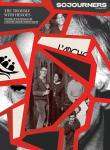MY SEMINARY PREACHING professor used to say that we should only tackle one of each week’s lectionary texts in our sermons, maybe — just maybe — tying in a second. Over the course of a career, a great preacher might have a couple of three-text sermons in her. But only a foolish preacher tries to preach all four. The problem with this month’s readings is that they contain a lot of four-text temptations. Their cumulative effect, though, tends toward incarnation: not just God enfleshed in Jesus, but God enfleshed in us all and, even, in all creation.
By the end of the month, Lazarus will be raised from the dead (John 11:1-45). He and his sisters, Mary and Martha, were among Jesus’ closest friends. So, it seems odd to me that when Jesus first hears the message that Lazarus is ill, he seems to shake it off (verses 3-4). I wonder if Jesus was surprised, then, when he learned that Lazarus had died (verse 32). I wonder if he was shaken, suddenly uncertain about his certainty. Later, Lazarus’ resurrection prefigures Christ’s own rising again in glory. But at this point in the story, we don’t yet know that life is coming. All we can see is death.
That’s the risk of incarnation; it’s the risk of not knowing. And that risk is why I find this story (and the arc that leads to it) so comforting. My comfort comes not just in knowing that Lazarus came back to life. More so, my comfort comes in knowing that, like us, Jesus — God in flesh — risks not quite knowing the way to and through the ending.
March 5
Born Again, and Again, and ...
Genesis 12:1-4a; Psalm 121; Romans 4:1-5, 13-17; John 3:1-17
THE TERM "BORN-AGAIN CHRISTIAN” comes loaded with cultural baggage. Increasingly associated (correctly or not) with Christian nationalism, it seems to describe a political conversion rather than a religious one. Indeed, a recent poll revealed that a statistically significant number of white U.S. Trump supporters who didn’t identify as born-again evangelicals in 2016 did so by 2020. This biblical term gets more fraught each passing day, enough so that most progressive Christians I know are pretty squeamish about it — myself included. Maybe it’s time to get less squeamish.
In this week’s gospel, Nicodemus asks Jesus, “How can anyone be born after having grown old? Can one enter a second time into the mother’s womb?” (verse 4). We’re so used to “born again” language that Nicodemus’ question can sound, well, dumb. He’s too literalist. Silly Nicodemus! But think how strange Jesus’ suggestion to be born again would sound if you’d never heard that phrase. Christians who want to rescue the idea of being born again from its right-wing connotations might find resources in that strangeness.
The idea of being born again has calcified around a particular narrow criterion. But I think Jesus meant for it to be more like a posture, an orientation — a continual disruption of all we think we’ve figured out about God so that the living God can always come to us anew. “The wind blows where it chooses,” Jesus says, “and you hear the sound of it, but you do not know where it comes from or where it goes” (verse 8). As we journey with Nicodemus, let’s let him remind us that to be born again is not a one-time event but rather the continual openness to God doing a new thing among us (Isaiah 43:19).
March 12
Divine Intimacy
Exodus 17:1-7; Psalm 95; Romans 5:1-11; John 4:5-42
THE GOSPEL READING this week of “the woman at the well” is familiar to most Christians. At a well, around noon, a tired Jesus asks a woman drawing water for a drink (verses 6-7). It makes sense that this story inspires much feminist engagement, but the most intriguing interpretation of it I’ve heard was an interreligious one. Back in graduate school, I took a class in a maximum-security prison. Twenty-four students — half from the university and half incarcerated men — met weekly to talk about our topic: women in the gospels.
When we reached the woman at the well, the Christians were immediately bored by familiarity — until one of the incarcerated men spoke up. “I don’t want to show any disrespect,” he said. “I’m a Muslim, and you Christians might not like this, but it sounds to me like these two are flirting.” His friends burst out laughing as the Christians looked at the passage anew. Two strangers. Secluded spot. Sticky, sweaty heat of the day. And despite their strangeness, something opens up between them and they see each other clearly.
I wasn’t offended by this interpretation, but I can imagine why others might be. The story is typically told as a revelation of Christ’s divinity: “He told me everything I have ever done,” the woman says (verse 39). Reading it as flirtation might reveal his humanity instead — and a pretty overlooked aspect of his humanity, at that. But what if we sat with the strangeness of this image for a moment — not to claim it as true, but to ponder what it might open up for us? Does God ever play hard to get? How intimate does intimacy with God-in-flesh get? Might we imagine the exhilaration of anticipating a divine connection that we don’t yet understand to be inevitable? How might we “flirt” with God?
March 19
The Ones We Hurt
1 Samuel 16:1-13; Psalm 23; Ephesians 5:8-14; John 9:1-41
I WAS "BORN AGAIN” in summer 1995, right as Coolio’s hit song “Gangsta’s Paradise” was introducing an unchurched generation to Psalm 23. “As I walk through the valley of the shadow of death,” Coolio sang, “I take a look at my life and realize there’s nothin’ left.”
The Christians trying (and succeeding) at converting me to Christ that summer used the song to prove that God’s Word speaks truth into every context. To me, though, it proved that context breathes new life into God’s Word. Of course, the revelatory relation between context and scripture is mutual. That’s what makes God’s Word living.
Theologian Karl Barth is known for saying that preachers should preach with the Bible in one hand and a newspaper in the other. Barth was right: We interpret the events of the day through the lens of scripture and interpret scripture in relation to the events of the day. But not only newspapers can narrate those events. We should also attend to art, pop culture, climate, the joy and despair of life together unfolding in the wake of COVID-19, and more. Scripture illuminates all these things, and all these things illuminate scripture. “Gangsta’s Paradise” concludes with the line, “Tell me why are we so blind to see / that the ones we hurt are you and me.” With these words, Coolio reframed Psalm 23’s valley of death. In light of the events of the day, I think the psalmist would agree.
March 26
A Mess of Bones
Ezekiel 37:1-14; Psalm 130; Romans 8:6-11; John 11:1-45
LAZARUS' RESURRECTION (John 11:1-45) prefigures Christ’s resurrection and, in Christ, the potential for resurrection for all God’s people. But Ezekiel’s spiritual descent to the valley of dry bones gives us a vision of the death that must precede that new life (Ezekiel 37:1-14). And it isn’t pretty!
Those of us used to seeing playful videos of dancing cartoon skeletons enacting the old spiritual “Dem Bones” have, perhaps, lost our bearings on how grotesque Ezekiel’s valley was. If these desiccated, brittle, and broken bones are “the whole house of Israel” (verse 11) — both Israel and (as many Christians believe) those grafted into Israel through Christ — then there are actually millions of bones. Enough bones that Ezekiel is wading not just waist deep, but up to the neck — at times, his head dipping below their surface as his feet crumbled them to dust. Then, if that image isn’t horrific enough, the earth starts to shake, graves open, more bones arise, and they all start rattling. The bones are then lifted on the wind of God’s breath. They assemble around Ezekiel, drawn together by sinew, then covered with flesh and skin (verse 6).
At this point, the bones are moving but, somehow, still lifeless (verse 8). And God tells Ezekiel to prophesy — which he does, standing in the eye of this bone tornado, screaming wildly into its void. God’s breath rises from Ezekiel’s lungs; God’s words speak across Ezekiel’s vocal cords: the breath of life flowing into lifeless bodies to make them live.
Ezekiel’s horrifying story reminds us that participating in God’s arc of incarnation — in God’s plan for redeeming this world — isn’t just messy; it’s dangerous. Incarnation entails risk. And the arc of readings this month promises that even when we’re faced with the terror of risk, God nevertheless still takes that risk with us.

Got something to say about what you're reading? We value your feedback!







